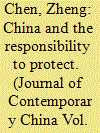| Srl | Item |
| 1 |
ID:
172559


|
|
|
|
|
| Summary/Abstract |
While China and Russia's general policies towards the Responsibility to Protect (R2P) are similar, the two reveal nuanced differences in addressing specific emergencies. Both express support for the first two pillars of R2P while resisting coercive intervention under its aegis, as they share anxieties of domestic political security and concerns about their international image. Nonetheless, addressing cases like the Syrian crisis, Russian statements are more assertive and even aggressive while Chinese ones are usually vague and reactive. This article highlights the two states’ different tones through computer-assisted text analyses. It argues that diplomatic styles reflect Russian and Chinese perceptions of their own place in the evolving international order. Experiences in past decades create divergent reference points and status prospects for them, which leads to their different strategies in signalling Great Power status. As Beijing is optimistic about its status-rising prospects, it exercises more self-restraint in order to avoid external containments and is reluctant to act as an independent ‘spoiler’. Meanwhile, Moscow interprets its Great Power status more from a frame of ‘loss’ and therefore is inclined to adopt a sterner approach to signal its status. Although their policies complement each other on many occasions, there is nothing akin to a Sino–Russian ‘bloc’.
|
|
|
|
|
|
|
|
|
|
|
|
|
|
|
|
| 2 |
ID:
147603


|
|
|
|
|
| Summary/Abstract |
This article investigates the Chinese government’s evolving policies toward the emerging global norm of ‘responsibility to protect’ (R2P). While its principle of non-interference persists, Beijing has gradually acknowledged the responsibility to respond to humanitarian catastrophes in certain circumstances. Meanwhile, to ensure the concept’s limited application and reducing the instances where it might breach state sovereignty, Beijing actively participated in relevant debates to shape R2P in a direction that gives primacy to capacity-building and preventative measures. After examining how China engaged with the R2P in the recent crises in Darfur, Libya and Syria, the article argues, perceived threat from R2P upon its regime security explains Beijing’s continued efforts to constrain the norm’s development, while its aspiration for a status of responsible power encourages the Chinese government to engage with R2P more actively and flexibly. The case of R2P thus sheds new light on the complex interactions between China and the evolving global order.
|
|
|
|
|
|
|
|
|
|
|
|
|
|
|
|
| 3 |
ID:
161512


|
|
|
|
|
| Summary/Abstract |
The Asian Infrastructure Investment Bank (AIIB) has been widely conceived as a Chinese effort to promote reforms of global financial governance. While the existing literature of contested multilateralism tends to focus on the problem of threat credibility, this article highlights the necessity of strategic reassurance in institutional contests. To facilitate incremental reforms of the existing order, rising powers like China need not only to pose credible challenge towards established institutions, but also to demonstrate their benign intentions and commitment to future cooperation. Besides revealing strength and resolve, the creation of a new multilateral regime helps rising powers to signal their self-restraints and reassure other powers. Consequently, the institutional configuration of new multilateral organizations involves a trade-off between the dual needs for threats and reassurance. Chinese behaviours in creating the AIIB can be explained through this framework.
|
|
|
|
|
|
|
|
|
|
|
|
|
|
|
|